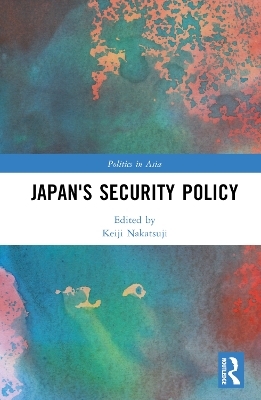
Japan's Security Policy
Seiten
2023
Routledge (Verlag)
978-1-032-13953-1 (ISBN)
Routledge (Verlag)
978-1-032-13953-1 (ISBN)
This book analyses Japan’s security policy after the Cold War and engages with the question of whether, since the Cold War ended, Japan has again become a global security player.
The contributions to the book explore Japan’s security policy by providing a detailed overview of the evolution of Japan’s security policy after the Cold War, including the Japan-U.S. Security Treaty and the Senkaku/Daioyu Islands dispute. It also reveals the preeminent security concerns of contemporary Japan by delving into regional security issues such as the Layered Security of Okinawa, the increasing nuclear threat from North Korea, and the Taiwan Strait Crisis of 1995-6. The book culminates by discussing security in terms of the essential functions of energy, food, and human security, including an assessment of Japan’s energy policy since World War II and an assessment of the impact food security on Japan’s agriculture and trade.
This book will be of interest to student and scholars of East Asian Politics, Security Studies and the International Relations of the Asia Pacific. It is also a valuable resource for diplomats and policymakers on Japan and East Asia.
The contributions to the book explore Japan’s security policy by providing a detailed overview of the evolution of Japan’s security policy after the Cold War, including the Japan-U.S. Security Treaty and the Senkaku/Daioyu Islands dispute. It also reveals the preeminent security concerns of contemporary Japan by delving into regional security issues such as the Layered Security of Okinawa, the increasing nuclear threat from North Korea, and the Taiwan Strait Crisis of 1995-6. The book culminates by discussing security in terms of the essential functions of energy, food, and human security, including an assessment of Japan’s energy policy since World War II and an assessment of the impact food security on Japan’s agriculture and trade.
This book will be of interest to student and scholars of East Asian Politics, Security Studies and the International Relations of the Asia Pacific. It is also a valuable resource for diplomats and policymakers on Japan and East Asia.
Keiji Nakatsuji is a Professor of the College of International Relations at Ritsumeikan University, Japan.
Part 1: Historical Overview 1. The Cold War and Japan-US Alliance as Backdrop 2. Post-Cold War Crises and A Search for a New Security Policy 3. Did Japan become a global security player again? Part 2: Regional Issues 4. Japan and South Korea: Can the two countries cooperate over North Korea nuclear crisis? 5. Layered Security on Okinawa: Engaging international, national, and subnational narratives 6. How did Japan take the Taiwan Strait Crisis of 1995-6 Part 3: Security Policy by Function 7. Japan’s Energy Security 8. Japan’s Food Security Policy 9. Why Did Japan Engage in Human Security Diplomacy?
| Erscheinungsdatum | 19.12.2022 |
|---|---|
| Reihe/Serie | Politics in Asia |
| Zusatzinfo | 3 Tables, black and white; 2 Line drawings, black and white; 2 Halftones, black and white; 4 Illustrations, black and white |
| Verlagsort | London |
| Sprache | englisch |
| Maße | 156 x 234 mm |
| Gewicht | 449 g |
| Themenwelt | Sozialwissenschaften ► Politik / Verwaltung ► Europäische / Internationale Politik |
| Sozialwissenschaften ► Soziologie ► Spezielle Soziologien | |
| ISBN-10 | 1-032-13953-6 / 1032139536 |
| ISBN-13 | 978-1-032-13953-1 / 9781032139531 |
| Zustand | Neuware |
| Informationen gemäß Produktsicherheitsverordnung (GPSR) | |
| Haben Sie eine Frage zum Produkt? |
Mehr entdecken
aus dem Bereich
aus dem Bereich
Studienbuch
Buch | Hardcover (2023)
De Gruyter Oldenbourg (Verlag)
CHF 62,90
Amerikas Strategie der Vorherrschaft und der Kampf um Eurasien
Buch | Softcover (2024)
NOMEN Verlag
CHF 27,95
erfolgreiche Interessenvertretung durch Prozesskompetenz im komplexen …
Buch | Hardcover (2023)
Wiley-VCH (Verlag)
CHF 58,75


